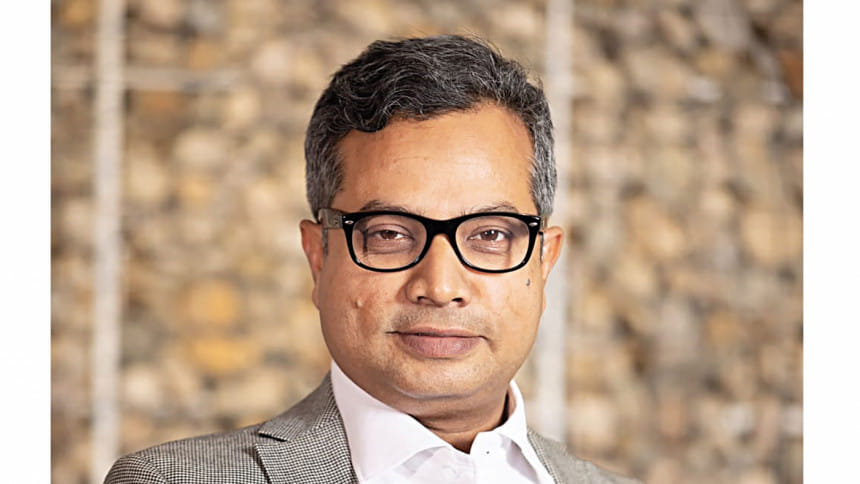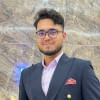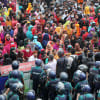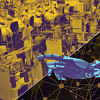Unravelling the Journey of Abdullah Hil Rakib: Insights on Leadership, Sustainability, and the Future of Business

In a candid conversation with Abdullah Hil Rakib, the Managing Director of Team Group and Director of BGMEA, we delved deep into the intricacies of his journey, the ethos of the organisation, and his vision for the future.
As an entrepreneur who has navigated the tumultuous waters of the business world with grace and determination, his insights offer a unique perspective on leadership, innovation, and the evolving economic landscape. Here's a glimpse into our enlightening discussion:
Can you tell us about your background and how you got started in the business world?
Initially, what started as a service job after my masters later turned into my entry into the business realm as a trader. This initial phase was instrumental in shaping my understanding of the industry.
However, as I delved deeper, I recognised the importance of having a platform that genuinely reflected my ethical values. This realisation was the catalyst for my decision to establish a manufacturing plant. It wasn't just about business; it was about creating opportunities and jobs and making a tangible difference in the economy.
What inspired you to become a manufacturer in the apparel industry?
A combination of passion and purpose drove my journey into the apparel manufacturing sector. As we grew as a trading house, the necessity of having our manufacturing plant became increasingly evident. This wasn't just about scaling our operations; it was about gaining a stronger foothold in negotiations with international buyers.
I was also motivated by the idea of not just producing garments but doing so in a manner that was ethically sound and added real value. The apparel industry, with its vast potential, is the perfect avenue to create a significant number of jobs and contribute positively to the economy.
Team Group has maintained a steady growth rate and is now a family of more than 20,000 people. What is the secret to this success?
The growth trajectory of Team Group is a testament to our unwavering commitment to core values. Our emphasis on environmental sustainability, good governance, and labour rights has been pivotal. But beyond these, it's our belief in social responsibility and our dedication to the broader ecosystem that has truly set us apart and fueled our growth.
We have evolved from a close-knit family of 300 individuals to a thriving community of 20,000 people. Our remarkable journey has been guided by a steadfast commitment to prioritise the well-being and contentment of every member of our extended family. Central to our ethos is unwavering ethical principles, and we have consistently upheld the values of happiness, safety, and fulfilment for all who are part of our journey.
What are some of the biggest challenges you have faced in the Business?
Over the years, we've encountered various formidable challenges. These include navigating market fluctuations, adapting to changing consumer preferences and mitigating the impact of global economic uncertainties. However, our ability to adapt, diversify, and invest in cutting-edge technology has allowed us to overcome these challenges and emerge stronger on the other side.
Team Group is one of the sustainably growing RMG Conglomerates of Bangladesh. How do you balance growth and sustainability side by side?
Sustainability isn't just a buzzword for us; it's a core principle. As we charted our growth path, we were acutely aware of the environmental implications and have always been committed to meeting all the SDG criteria.
Our commitment is evident in our green manufacturing plants and our continuous efforts to strike a balance between growth and sustainability. It's a challenging endeavour, but our dedication to both the planet and our business drives us forward.
You have been a successful Apparel manufacturer. Why did you choose to diversify to unrelated industries?
The decision to diversify stemmed from a forward-looking vision. While I have immense faith in the RMG industry, it will face challenges beyond 2040, primarily as Bangladesh progresses and moves beyond its status as a Least Developed Country (LDC) by the year 2030.
To ensure the longevity and resilience of our business, we ventured into sectors like pharmaceuticals with Team Pharma, IT, real estate, and retail, creating a notable brand such as Twelve. This diversification strategy is our hedge against future uncertainties, and we are definitely focused on pushing them towards success.
You have infused life into many dead factories. What inspired you to choose this difficult path?
From a business perspective, when we initially started, we simply didn't have enough capital to establish entirely new manufacturing facilities. In response, we strategically chose to invest in dormant or underperforming plants, seeing an opportunity to breathe new life into these facilities.
The decision to rejuvenate dead factories was more than just a business move; it was a mission. Every factory we revived represented saved jobs, salvaged investments, and renewed hope. The path was fraught with challenges, but the idea of transforming these dormant entities into thriving businesses was a driving force.
How do you see the RMG industry evolving in the next five years?
Looking ahead to the next five years, I'm optimistic about the RMG industry. I anticipate a shift towards man-made fibres and see significant potential for vertical integration alongside technological growth. These evolutions will be crucial, especially as we approach milestones like the LDC graduation. We need to cover up in the next 5-8 years and for ensuring global competitiveness, we need to apply for GSP plus.
What role do you see technology playing in the future of the industry?
Technology will be the linchpin of the industry's future. Embracing automation and digital transformation will not only enhance our efficiency but also redefine the value we offer. Beyond just operational benefits, technology will pave the way for intellectual job creation, further elevating the industry's stature and upskilling our workforce.
In essence, looking ahead, our vision involves generating $150 million in revenue from a single manufacturing plant, compared to our current $92 million, and it's impossible to reach this without the help of technological advancements.
You have been very actively involved with BGMEA for more than ten years. What is your aspiration with the association?
My association with BGMEA has been a journey of mutual growth. It absolutely comes from the thought of giving back to our community. It's about learning and growing together. As a director for three terms, my aspiration has always been to champion the industry's cause, ensuring it gets the representation it deserves.
I have actively contributed to the establishment of innovation centres and the promotion of new market development, all with a steadfast focus on fostering growth within our RMG sector and ensuring the well-being and contentment of our workforce. Whether it's negotiations or setting the strategic direction, I aim to elevate the industry on all fronts.
How do you stay up-to-date on industry trends and best practices?
Staying updated is a continuous process. I make it a point to travel, attend global fairs, and immerse myself in technology and fashion trends. Additionally, forging partnerships with universities and research institutions has been invaluable in keeping me abreast of the latest developments.
Recently, you've been a massive part of BUFT. What are your aspirations with BUFT?
My involvement with BUFT has been driven by the aspiration to create a solid industry-academia partnership. I aim to prepare students at BUFT for the industry by exposing them to real-world practices and ensuring they are well-equipped with the necessary skills and knowledge.
I intend to engage students in research activities to bridge the gap between academic learning and practical application. Ultimately, my goal is to contribute to shaping a more capable and industry-ready RMG workforce through BUFT.
How do you foster a culture of innovation and creativity within your organisation?
Innovation and creativity are the lifeblood of any organisation. It's a mindset that doesn't happen overnight; it needs constant fostering. I believe in creating an environment where every team member feels empowered to share their ideas, no matter how unconventional they might seem.
We regularly organise sessions and programs to keep the spirit of innovation alive. Moreover, by celebrating successes and learning from failures, we've cultivated a culture where taking calculated risks is encouraged.
Can you tell us about a time when you had to pivot your business strategy in response to changing market conditions?
Indeed, one of the most challenging times was during the COVID-19 pandemic. The global market dynamics shifted rapidly, and we found ourselves facing unprecedented challenges.
Bangladesh's commitment to WHO protocols has been showcased globally.
We had to pivot our strategy, focusing more on digital platforms, re-evaluating our supply chains, and ensuring the safety of our employees. From only 52 employees on Microsoft Teams before the pandemic, in just six months, this number reached 600. It was a period of intense learning, but it also reinforced the importance of adaptability in business.
How do you ensure that your organisation is operating in an ethical and socially responsible manner?
Ethical operations and social responsibility are at the core of my and Team's values. We have stringent policies in place to ensure that our processes align with the highest ethical standards. Regular audits, both internal and external, help us maintain transparency.
Moreover, our commitment to sustainability, labour rights, and community outreach programs underscores our dedication to operating responsibly. All of our factories have fair-price shops and outstanding medical facilities. We also currently have 53 people with disabilities working for us, who are no less than any of our other members.
How do you ensure that your organisation is staying competitive in a rapidly changing market?
Our organisation's competitiveness is ensured through a multifaceted approach that places a strong emphasis on our workforce's well-being and skill development. Investing in our employees, providing them with a happy and supportive work environment, and fostering their skill growth ultimately leads to better efficiency and effectiveness.
This approach helps us retain our skilled workforce, which is crucial in keeping pace with market changes. While some competitors may prioritise short-term commercial profits, we focus on nurturing a workforce that is not only highly skilled but also deeply committed to our organisation's goals and values.
In essence, our organisation's competitiveness is not solely measured by commercial gains but also by the profound impact we make on our employees' lives and the positive returns we receive in terms of their dedication, efficiency, and ability to navigate market dynamics.
How do you balance the needs of your customers, employees, and shareholders in your decision-making process?
Balancing the needs of our customers, employees, and shareholders is achieved by having a customer-centric approach, prioritising employee well-being, keeping shareholders engaged, and emphasising a common goal of satisfying customers. This alignment fosters collaboration and ensures sustainable success.
And the ultimate truth is that all of this is tied together. The company's goal is to support the customer, the employees' goal is to keep the company, and the shareholders' goal is to help the employees in order to achieve our mutual goal.
Recently, you won the Kotler Award 2023 as Entrepreneur of the Year. As a successful business leader, how do you see the change in the economic landscape in the upcoming years? How ready is our economy to face this sort of challenge?
Winning the Kotler Award was a humbling experience. It's a testament to the hard work of not only me but our entire team. When it comes to understanding the changes in the economic landscape in the upcoming years, a critical factor in achieving sustained economic growth is the transformation of both mentality and mindset among people.
As we approach the threshold of becoming middle-income countries, we must address various challenges and issues. One fundamental aspect is the need to prioritise ethical standards in our economic activities, shifting our focus from purely profit-driven motives to a more holistic perspective that considers the well-being of both people and the planet, ultimately bridging the gap between developed and developing nations.
Additionally, a strong emphasis on human development indices, such as education, healthcare, and living standards, is essential to ensure our economy's readiness to face future challenges, creating a more resilient and sustainable economic landscape.

 For all latest news, follow The Daily Star's Google News channel.
For all latest news, follow The Daily Star's Google News channel. 








Comments